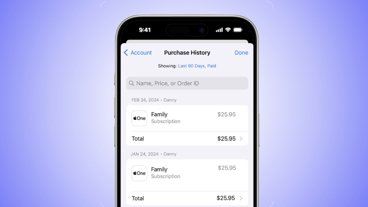The complaint, tracked down by Nalay Patel, states that "as of March 2011," the company had sold more than 108 million iPhones, 19 million iPads, and 60 million iPod touch units.
The iPhone's shadow
The new figure for iPod touch sales is notable in that it indicates how much the success of the iOS App Store is supported by the iPod touch. While Apple regularly reports iPhone and iPad sales, the company does not always break out the proportion of iPods capable of running iOS apps.
The installed base of 60 million iPod touch units suggests that roughly 36 percent of all handheld iOS devices are iPods, a substantial supporting factor strengthening demand for iOS apps. App Store analytics have indicated that iPod touch users also tend to buy more apps than iPhone or other smartphone users.
The iPad also bolsters the iOS App Store, but analytics indicate that iPad users prefer tablet optimized apps rather than being content running iPhone apps blown up to fill the screen. Apple has largely augmented its more than 350,000 iPhone apps with more than 65,000 iPad apps, creating new app business with the iPad rather than just stretching the existing demand of iPhone and iPod touch users.
Other mobile platforms, including Google's Android, Microsoft's WP7, RIM's BlackBerry and HP's webOS, lack a viable equivalent to Apple's iPod touch, with almost all of their focus being devoted to smartphones. Android licensees, RIM and HP are all developing tablets to take on the iPad, but little focus has directed to delivering an iPod-alternative.
Microsoft recently scuttled its Zune HD, the closest competing product to the iPod touch, but the Zune was never made compatible with Microsoft's Windows Mobile, KIN, or Windows Phone products, erasing any Zune "app halo" for its smartphone platforms.
Samsung recently announced plans to deliver an Android music player under its Galaxy brand (and it is covered in Apple's infringement suit), but Samsung also lacks the music business credentials that Apple has built over the last decade with the iPod and its iTunes ecosystem, and its Galaxy Player is not yet selling in quantity, making the iPod touch a unique entity in the smartphone market.
A peak at Apple's Q2 numbers
The wording of Apple's complaint does not clarify whether the stated sales numbers were reached by the beginning of March, at some point during, or by the end of the month.
Apple is expected to report actual sales numbers for iPhones and iPads sold during the first calendar quarter of 2011 tomorrow during its earnings conference call for the company's fiscal Q2. The numbers in the complaint, however, provide an early suggestion that Apple has sold at least 18 million iPhones, 4 million iPads (the wording does not clarify whether this only includes the original iPad or also figures in the iPad 2, which launched in late February) and around 5 million iPod touch devices.
A compilation of analysts' predictions by the Fortune "Apple 2.0" blog indicates a Wall Street consensus of just 16.23 million iPhones and 6.22 million iPads, while amateur or unaffiliated analysts predict sales of 18.03 million iPhones and 6.84 million iPads.
Both groups predict that Apple sold around 9.8-9.9 million iPods; the company has previously noted that about half of its iPod sales are iPod touch units. Those figures would harmonize with the idea of Apple selling around 5 million iPod touch units in the first three months of 2011, for a total of at least 60 million iPod touch units since it went on sale in late 2007.
 Daniel Eran Dilger
Daniel Eran Dilger






-m.jpg)






 Malcolm Owen
Malcolm Owen
 William Gallagher
William Gallagher
 Charles Martin
Charles Martin
 Christine McKee
Christine McKee
 Wesley Hilliard
Wesley Hilliard

 Andrew Orr
Andrew Orr








17 Comments
So we have 186 million iOS-based iDevices as of March, not the end of. They might not have have hit the 200 million milestone by the end of the quarter but they surely reached it by their earnings call tomorrow.
Will they mention that in the call? I think they’ll definitely mention the 100 million iPhone milestone but the total App Store ecosystem is more important in my opinion.
Will they count AppleTV numbers in the iOS numbers? I don’t think it make much sense under their is a direct line to 3rd-party apps from Xcode and even then I question it since it doesn’t use CocoaTouch.
The key phrase here:
"The wording of Apple's complaint does not clarify whether the stated sales numbers were reached by the beginning of March, at some point during, or by the end of the month. "
That makes the numbers very nearly worthless, except maybe for the iPhone number which is a good number if it's the end of March or phenomenal if it's the beginning.
The key phrase here:
"The wording of Apple's complaint does not clarify whether the stated sales numbers were reached by the beginning of March, at some point during, or by the end of the month. "
That makes the numbers very nearly worthless, except maybe for the iPhone number which is a good number if it's the end of March or phenomenal if it's the beginning.
It gives a minimum total units for the quarter across 3 products. That's something we didn't know yesterday.
The complaint, tracked down by Nalay Patel, states that "as of March 2011," the company had sold more than 108 million iPhones, 19 million iPads, and 60 million iPod touch units.
I think we need to remember that these are lawyers we're talking about. "As of March" means the very last second of February. IMHO, this makes it extremely likely that Apple is about to post a blowout 2nd quarter, a 2nd quarter that may represent a more than 100% increase in earnings over the 2nd quarter a year ago. And it's also likely to pump up its cash horde to nearly $65 billion with zero debt.
This from a company that has the second largest market capitalization in the world. Companies that big aren't supposed to be doing this kind of thing.
Apple: The oldest and biggest startup company - ever.
I am expecting to see a huge rise in my Apple stock worth the next few weeks based on this kinda thing....